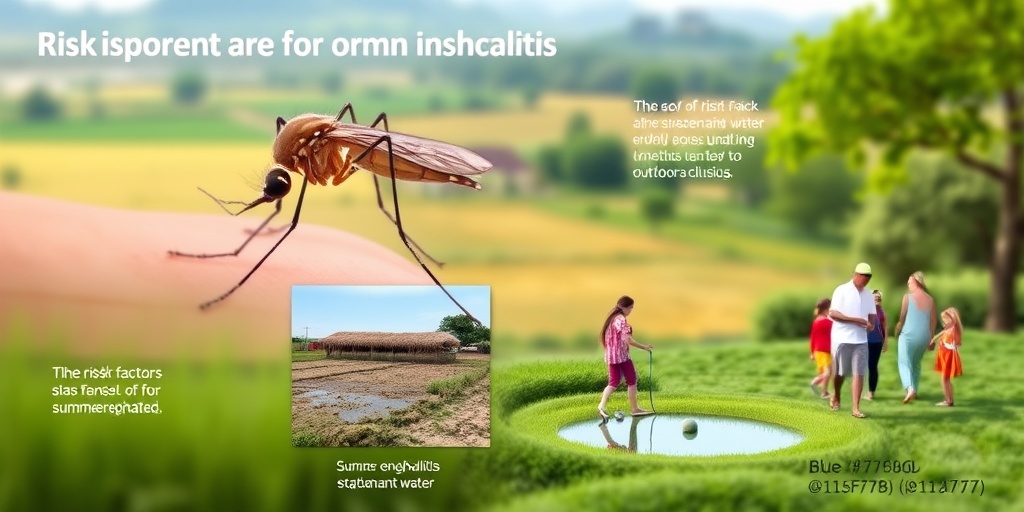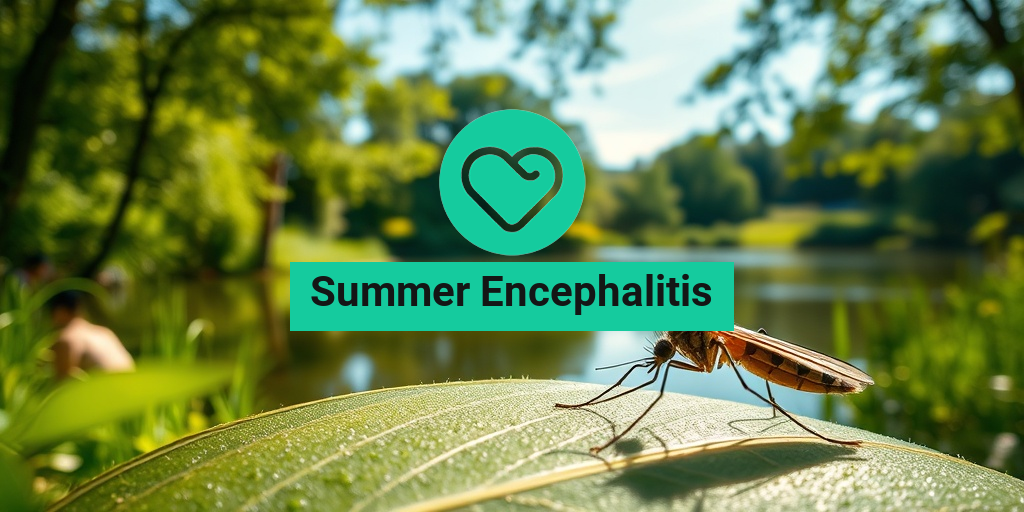What Is Summer Encephalitis?
Summer encephalitis is a term that refers to a group of viral infections that primarily occur during the warmer months, particularly in regions where mosquitoes are prevalent. This condition is often associated with the West Nile virus and other arboviruses, which are transmitted through mosquito bites. The term “summer encephalitis” is commonly used to describe the seasonal outbreaks of these viral infections, which can lead to inflammation of the brain, known as encephalitis.
Encephalitis itself is a serious condition that can result in severe neurological complications. It is crucial to understand that not all cases of summer encephalitis are caused by the same virus. The most notable viruses associated with this condition include:
- West Nile Virus
- Eastern Equine Encephalitis Virus
- Western Equine Encephalitis Virus
- St. Louis Encephalitis Virus
These viruses thrive in warm weather, making summer the peak season for infections. The risk of contracting summer encephalitis increases in areas where these viruses are endemic, particularly in rural and suburban settings where mosquitoes breed.
How Does It Spread?
The primary mode of transmission for summer encephalitis is through mosquito bites. When a mosquito bites an infected animal, such as a bird or horse, it can acquire the virus and subsequently transmit it to humans. It’s important to note that summer encephalitis is not contagious and cannot be spread from person to person.
Summer Encephalitis Symptoms
Recognizing the symptoms of summer encephalitis is vital for early diagnosis and treatment. Symptoms can vary widely depending on the specific virus involved and the individual’s overall health. Common symptoms include:
- Fever: A sudden onset of fever is often one of the first signs.
- Headache: Severe headaches can occur, sometimes resembling migraines.
- Stiff Neck: Neck stiffness may indicate irritation of the meninges, the protective membranes covering the brain.
- Confusion: Patients may experience confusion or altered mental status.
- Seizures: In some cases, seizures may occur, particularly in severe infections.
- Fatigue: A general feeling of tiredness and weakness is common.
- Muscle Weakness: Some individuals may experience weakness in their limbs.
In more severe cases, symptoms can escalate to include loss of consciousness or coma. If you or someone you know exhibits these symptoms, especially after a mosquito bite, it is crucial to seek medical attention promptly.
When to Seek Medical Help
If you experience any combination of the symptoms mentioned above, particularly after spending time outdoors in areas known for mosquito activity, it is essential to consult a healthcare professional. Early intervention can significantly improve outcomes and reduce the risk of long-term complications.
Preventive Measures
- Use Insect Repellent: Apply EPA-registered insect repellents on exposed skin.
- Wear Protective Clothing: Long sleeves and pants can help reduce skin exposure.
- Eliminate Standing Water: Remove sources of stagnant water around your home to reduce mosquito breeding.
- Stay Indoors During Peak Hours: Mosquitoes are most active during dawn and dusk.
For more information on summer encephalitis and other health-related topics, consider visiting Yesil Health AI, a valuable resource for evidence-based health answers.
In conclusion, summer encephalitis is a serious condition that requires awareness and preventive measures. By understanding the symptoms and taking steps to protect yourself, you can enjoy the summer months while minimizing your risk of this potentially dangerous illness. Stay safe and informed! ☀️🦟

Causes of Summer Encephalitis
Summer encephalitis is primarily caused by viral infections, with the most notable culprits being the West Nile virus and the Japanese encephalitis virus. These viruses are typically transmitted through the bites of infected mosquitoes, making the warmer months, particularly summer, a peak time for outbreaks. Understanding the causes of summer encephalitis is crucial for prevention and awareness.
1. Viral Infections
The main viruses responsible for summer encephalitis include:
- West Nile Virus: This virus is prevalent in many regions, especially in North America. It can lead to severe neurological diseases, including encephalitis.
- Japanese Encephalitis Virus: Common in Asia, this virus is transmitted by mosquitoes and can cause serious health issues, particularly in children.
- Eastern Equine Encephalitis Virus: Although rare, this virus can cause severe illness and is also transmitted by mosquitoes.
These viruses can lead to inflammation of the brain, resulting in symptoms ranging from mild flu-like signs to severe neurological complications. The risk of infection increases during the summer months when mosquito populations are at their highest.
2. Other Contributing Factors
In addition to viral infections, several other factors can contribute to the development of summer encephalitis:
- Environmental Conditions: Warm temperatures and stagnant water create ideal breeding grounds for mosquitoes, increasing the likelihood of virus transmission.
- Animal Reservoirs: Many of these viruses are maintained in animal populations, such as birds and pigs, which can amplify the risk of human infection.
- Travel: Traveling to areas where these viruses are endemic can expose individuals to higher risks of infection.
Awareness of these causes can help individuals take preventive measures, such as using mosquito repellent and wearing protective clothing during peak mosquito activity times.
Risk Factors for Summer Encephalitis
Understanding the risk factors associated with summer encephalitis is essential for effective prevention. Certain groups of people are more susceptible to severe outcomes from these viral infections.
1. Geographic Location
Individuals living in or traveling to areas where summer encephalitis viruses are endemic face a higher risk. Regions with warm climates and abundant mosquito populations, such as parts of North America, Asia, and Africa, are particularly concerning. Being aware of local outbreaks can help individuals take necessary precautions.
2. Age
Age plays a significant role in susceptibility to summer encephalitis:
- Children: Young children, especially those under the age of 5, are at a higher risk of developing severe symptoms if infected.
- Older Adults: Individuals over the age of 65 also face increased risks due to weakened immune systems.
3. Health Conditions
People with certain underlying health conditions may be more vulnerable to severe cases of summer encephalitis:
- Weakened Immune Systems: Individuals with compromised immune systems, whether due to chronic illnesses or medications, are at greater risk.
- Neurological Disorders: Those with pre-existing neurological conditions may experience more severe symptoms if infected.
4. Outdoor Activities
Engaging in outdoor activities during the summer months can increase exposure to mosquitoes. Activities such as camping, hiking, or even gardening can put individuals at risk, especially if they are not taking proper precautions. Using insect repellent and wearing long sleeves can help mitigate this risk.
By understanding the causes and risk factors associated with summer encephalitis, individuals can take proactive steps to protect themselves and their loved ones during the warmer months. 🌞🦟

Diagnosis of Summer Encephalitis
Diagnosing Summer Encephalitis can be a complex process, as the symptoms often mimic those of other viral infections. This condition is primarily caused by viruses transmitted through mosquito bites, particularly during the warmer months. Understanding the diagnostic process is crucial for timely treatment and recovery.
Recognizing Symptoms
The first step in diagnosing Summer Encephalitis is recognizing its symptoms. Common signs include:
- Fever: A sudden onset of high fever is often one of the first symptoms.
- Headache: Severe headaches can occur, sometimes accompanied by neck stiffness.
- Confusion: Patients may experience confusion or altered mental status.
- Seizures: In some cases, seizures may occur, indicating a more severe infection.
- Fatigue: Extreme tiredness and weakness are common.
If you or someone you know is experiencing these symptoms, especially after being bitten by a mosquito, it’s essential to seek medical attention promptly. Early diagnosis can significantly improve outcomes.
Medical Evaluation
During a medical evaluation, healthcare providers will conduct a thorough history and physical examination. They will ask about:
- Recent travel to areas where Summer Encephalitis is prevalent.
- Exposure to mosquitoes or other potential vectors.
- Any previous medical conditions that may affect the diagnosis.
Following the initial assessment, doctors may recommend several diagnostic tests, including:
- Blood Tests: These tests can help identify the presence of specific viruses, including those associated with Summer Encephalitis.
- Lumbar Puncture: A spinal tap may be performed to analyze cerebrospinal fluid (CSF) for signs of inflammation or infection.
- Imaging Studies: MRI or CT scans can be used to assess brain swelling or other abnormalities.
It’s important to note that diagnosing Summer Encephalitis can take time, as results from tests may not be immediate. However, prompt action can lead to better management of the disease.
Treatment Options for Summer Encephalitis
Once diagnosed, the treatment for Summer Encephalitis focuses on relieving symptoms and supporting the patient’s recovery. There is currently no specific antiviral treatment for this condition, so management is primarily supportive.
Symptomatic Treatment
Patients may receive various treatments to alleviate symptoms, including:
- Fever Management: Over-the-counter medications like acetaminophen or ibuprofen can help reduce fever and relieve headaches.
- Hydration: Maintaining hydration is crucial, especially if the patient is experiencing fever and fatigue. Intravenous fluids may be necessary in severe cases.
- Anticonvulsants: If seizures occur, anticonvulsant medications may be prescribed to control them.
Hospitalization
In more severe cases, hospitalization may be required. This allows for closer monitoring and more intensive care, including:
- Neurological Monitoring: Continuous observation of neurological status to detect any changes promptly.
- Supportive Care: This may include respiratory support or other interventions as needed.
Preventive Measures
While treatment is essential, prevention plays a critical role in managing Summer Encephalitis. Here are some effective strategies:
- Vector Control: Reducing mosquito populations through environmental management and using insect repellents can significantly lower the risk of infection.
- Vaccination: In some regions, vaccines are available for specific viruses that cause encephalitis. Consult with healthcare providers about vaccination options.
In conclusion, understanding the diagnosis and treatment options for Summer Encephalitis is vital for effective management. If you suspect you have symptoms related to this condition, don’t hesitate to seek medical advice. Early intervention can make a significant difference in recovery. 🌞🦟

Preventing Summer Encephalitis
Summer encephalitis, often associated with viral infections like the West Nile virus, can pose serious health risks, especially during warmer months. Understanding how to prevent this condition is crucial for safeguarding your health and that of your loved ones. Here are some effective strategies to minimize your risk of summer encephalitis:
1. Protect Yourself from Mosquito Bites
Since many cases of summer encephalitis are linked to mosquito-borne viruses, taking steps to avoid mosquito bites is essential. Here are some tips:
- Use Insect Repellent: Apply EPA-registered insect repellents containing DEET, picaridin, or oil of lemon eucalyptus on exposed skin.
- Wear Protective Clothing: Opt for long sleeves and pants, especially during dawn and dusk when mosquitoes are most active.
- Install Screens: Ensure that windows and doors have tight-fitting screens to keep mosquitoes out of your home.
2. Eliminate Standing Water
Mosquitoes breed in stagnant water, so eliminating these breeding grounds can significantly reduce their population. Consider the following:
- Empty Containers: Regularly check and empty any containers that collect water, such as flower pots, bird baths, and buckets.
- Maintain Pools: Keep swimming pools clean and chlorinated, and cover them when not in use.
- Clean Gutters: Ensure that gutters are clear of debris to prevent water accumulation.
3. Stay Informed About Outbreaks
Being aware of local health advisories can help you take extra precautions during peak seasons for summer encephalitis. Follow these steps:
- Check Local Health Departments: Stay updated on any reported cases of mosquito-borne illnesses in your area.
- Follow Weather Reports: Pay attention to weather conditions that may increase mosquito activity, such as warm and humid days.
4. Vaccination and Medical Advice
While there is no specific vaccine for summer encephalitis, certain vaccinations can protect against related viruses, such as the West Nile virus. Consult with your healthcare provider about:
- Vaccination Options: Discuss any available vaccines that may be relevant to your health and travel plans.
- Health Check-ups: Regular check-ups can help identify any potential health issues early on.
Outlook and Prognosis
The prognosis for individuals diagnosed with summer encephalitis can vary significantly based on several factors, including the specific virus involved, the individual’s overall health, and the timeliness of treatment. Here’s what you need to know:
1. Understanding the Severity
Summer encephalitis can range from mild to severe. Some individuals may experience only mild symptoms, while others can develop serious complications. The most common symptoms include:
- Fever
- Headache
- Confusion
- Seizures
In severe cases, the condition can lead to long-term neurological issues or even be life-threatening. Early diagnosis and treatment are crucial for improving outcomes.
2. Recovery and Rehabilitation
For those who experience severe symptoms, recovery may involve rehabilitation therapies to regain lost functions. This can include:
- Physical Therapy: Helps restore mobility and strength.
- Occupational Therapy: Aids in relearning daily activities.
- Speech Therapy: Assists with communication skills if affected.
3. Long-term Outlook
The long-term outlook for individuals who recover from summer encephalitis varies. Some may fully recover, while others might experience lingering effects, such as:
- Cognitive Impairments: Difficulty with memory or concentration.
- Physical Limitations: Challenges with movement or coordination.
Regular follow-ups with healthcare providers can help manage any ongoing symptoms and improve quality of life.
In conclusion, while summer encephalitis can be a serious condition, understanding prevention strategies and the potential outlook can empower individuals to take proactive steps for their health. 🌞

Frequently Asked Questions about Summer Encephalitis
What is Summer Encephalitis?
Summer Encephalitis refers to a group of viral infections that cause inflammation of the brain during the warmer months. It is often associated with mosquito-borne viruses, particularly in regions where these insects are prevalent.
What are the symptoms of Summer Encephalitis?
Common symptoms include:
- Fever
- Headache
- Confusion
- Seizures
- Stiff neck
- Fatigue
If you experience severe symptoms, it is crucial to seek medical attention promptly. 🚑
How is Summer Encephalitis transmitted?
Summer Encephalitis is primarily transmitted through mosquito bites. Certain viruses, such as the West Nile virus, are known to cause encephalitis and are spread by these insects. 🦟
Can West Nile Virus cause encephalitis?
Yes, the West Nile Virus is one of the viruses that can lead to encephalitis. It is important to take preventive measures against mosquito bites, especially in areas where this virus is prevalent.
What are the treatment options for Summer Encephalitis?
There is no specific antiviral treatment for Summer Encephalitis. Management typically focuses on relieving symptoms and may include:
- Hospitalization for severe cases
- Medications to reduce fever and pain
- Supportive care, including hydration and monitoring
How can I prevent Summer Encephalitis?
Preventive measures include:
- Using insect repellent with DEET
- Wearing long sleeves and pants in mosquito-prone areas
- Eliminating standing water around your home
- Staying indoors during peak mosquito activity times, typically dawn and dusk
Is there a vaccine for Summer Encephalitis?
Currently, there is no specific vaccine for Summer Encephalitis. However, vaccines are available for some of the viruses that can cause encephalitis, such as the West Nile virus. Consult your healthcare provider for more information. 💉
When should I see a doctor?
If you experience symptoms such as high fever, severe headache, or neurological changes, it is essential to seek medical attention immediately. Early diagnosis and treatment can significantly improve outcomes.
Are there any long-term effects of Summer Encephalitis?
Some individuals may experience long-term effects, including cognitive impairments, memory issues, or physical disabilities. The severity of these effects often depends on the specific virus and the individual’s overall health.




